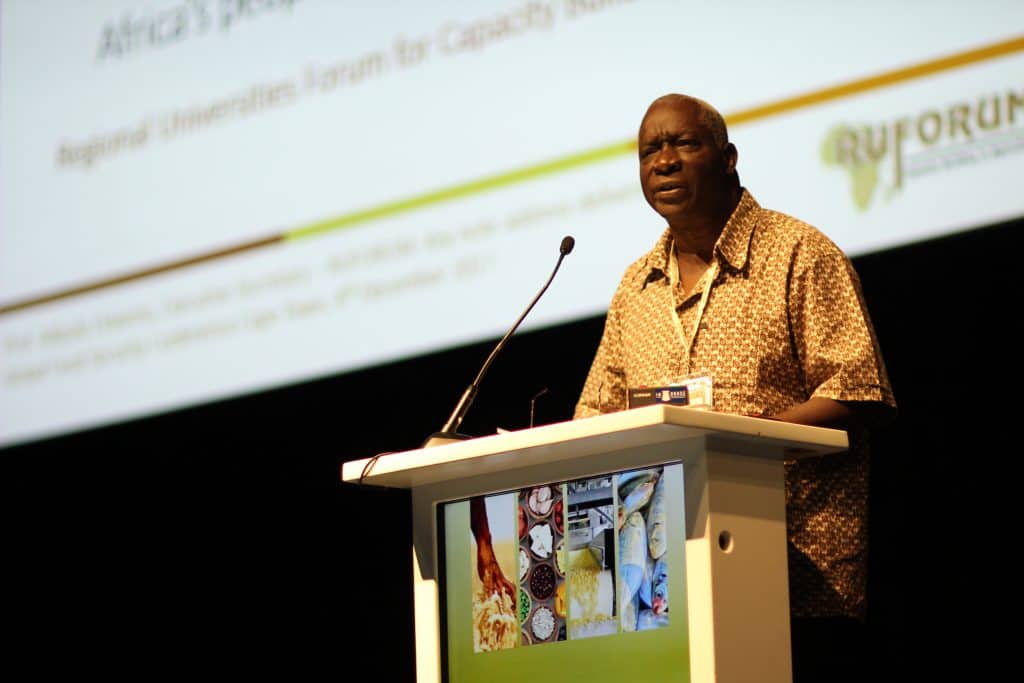
Professor Adipala Ekwamu, executive director the of the Regional Universities Forum for Capacity Building in Agriculture (RUFORUM)
Management of Africa’s spiraling population growth is crucial to addressing hunger and adequate food production for the continent, but also the potential to end food shortages globally.
That was the warning sounded by Ugandan Professor Adipala Ekwamu during his keynote address on the second day of the 3rd International Conference on Global Food Security, taking place at the Cape Town International Conference Centre.
The professor, executive director the of the Regional Universities Forum for Capacity Building in Agriculture (RUFORUM), highlighted the controversial issue of runaway population growth, along with strategies to attract youth to the agricultural sector, among his top interventions necessary for Africa to realise its potential of becoming the world’s food basket.
In his address, entitled Investing in Potential: Africa’s People and Land Feeding the World, Ekwamu pointed to the fact that Africa’s people currently account for 17% of the world’s population, but that this was forecast to rise to 40% by the end of the century – one of the fastest and most radical demographic changes in history. Globally, by 2030 the world would need to be in a position to feed an additional billion people.
Against this background, Africa’s capacity to increase productivity to feed the world was in fact declining, from 1.8% in the 1970s to 0.5% now.
On the issue of the youth, Ekwamu stressed that farming had become an old man’s game, and that without innovative efforts to attract the youth, the continent would never realise its potential.
“The majority of youth are not interested in agriculture, and that’s a dilemma we must deal with, along with our population dynamics. How do we attract the youth to farming in a way that they see it as a lucrative business? That’s the big question.”
Ultimately, the world’s ability to rely, as it had previously, on the US, India and the Far East, and South American countries like Brazil and Argentina for food delivery, was no longer feasible.
“That leaves Africa, and if we harness our potential, we will be able to contribute to increased agricultural outputs for feeding the world.
“But to do this, we must see significant public and private sector investment, and we must work on policy issues and make the policies which are in place work better for us,” Ekwamu urged.
He cited Ethiopia as an example of what was possible. After making dramatic changes, that country was beginning to feed itself, moving from being a poverty nexus to becoming of the most food-secure countries in the world.
Having the land – and we do have the land, Ekwamu said – wasn’t enough. What was required were creative alternatives to turn potential to reality, making the land productive while also ensuring environmental health and sustainability.
South Africa, with its strong science base, had a vital role to play regionally. “South Africa has strong research capacity and must work with the rest of Africa, building science and technology innovation and capacity that can help shape sound government policies.
“Skills and policies are essential fundamentals to allow us to take advantage of our opportunities,” he said.
The 3rd International Conference on Global Food Security, is organised by Elsevier in association with the DST-NRF Centre of Excellence in Food Security – jointly hosted by the University of the Western Cape and University of Pretoria.
related Articles
Unique food and nutrition journey
“Worcester was recently the location of a ‘learning journey’ where participants gained first-hand experience of challenges in the town’s food…
Researcher wants to give starchy pap a health makeover
While it’s by no means the sole culprit, as with all starchy, high-GI foods, pap has been linked with conditions…
Poor have borne the brunt of “inappropriate” Covid-19 regulations, experts say
The loss of jobs and desperately needed revenue to the state resulting from Covid-19-related restrictions will negatively impact the critical…



